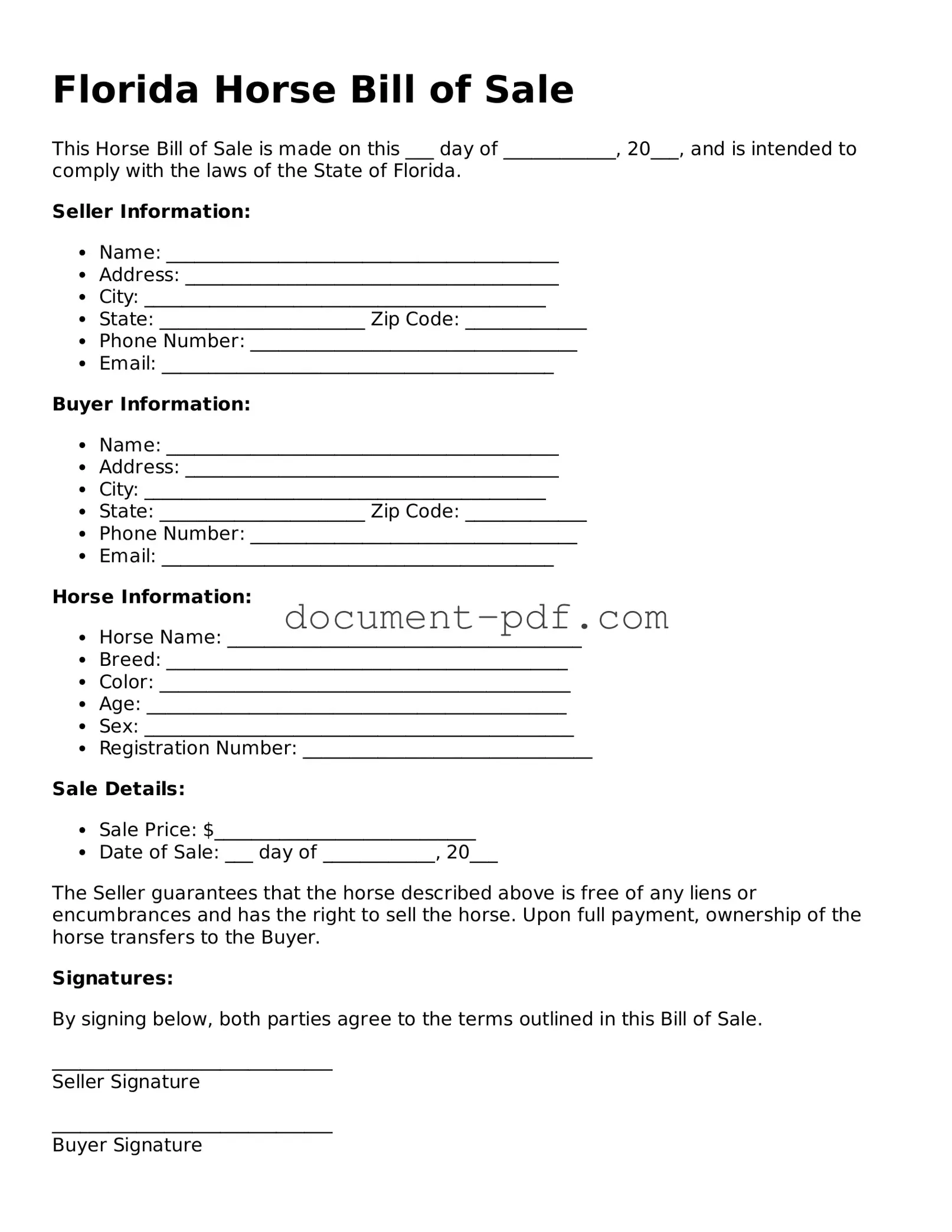The Florida Horse Bill of Sale form is similar to the Vehicle Bill of Sale. Both documents serve as proof of transfer of ownership for a valuable asset. Just like the horse bill, the vehicle bill includes details such as the buyer's and seller's information, a description of the vehicle, and the purchase price. This ensures that both parties have a clear record of the transaction, which can be important for legal and tax purposes.
Another document that shares similarities is the Boat Bill of Sale. This form, like the horse bill, is used to officially transfer ownership of a boat from one party to another. It includes essential details such as the vessel's description, the names of the buyer and seller, and the sale price. Both documents help protect the rights of both parties and provide a legal record of the transaction.
The Livestock Bill of Sale is also comparable to the Horse Bill of Sale. This document is specifically designed for the sale of livestock, including cattle, pigs, and sheep. It contains similar elements, such as the identification of the animals being sold, the seller's and buyer's information, and the sale price. This ensures that all parties are aware of the terms of the sale and provides legal protection for the transaction.
The Personal Property Bill of Sale is another document that aligns with the Horse Bill of Sale. This form is used for the sale of personal items, which can range from furniture to equipment. Like the horse bill, it outlines the details of the transaction, including the description of the item, the buyer and seller's information, and the price. Both documents serve to formalize the sale and protect the interests of both parties involved.
In addition, the Mobile Home Bill of Sale is similar in function to the Horse Bill of Sale. This document is used when transferring ownership of a mobile home. It includes details such as the mobile home's identification number, the names of the buyer and seller, and the purchase price. Both documents provide a clear record of the transaction, which is essential for legal purposes and future ownership verification.
The Equipment Bill of Sale is another relevant document. It is used for the sale of heavy machinery or other equipment. Like the horse bill, it contains information about the buyer and seller, a detailed description of the equipment, and the sale price. This ensures that both parties have a clear understanding of the transaction and protects their rights in case of disputes.
The Motorcycle Bill of Sale is also akin to the Horse Bill of Sale. This form is specifically for the sale of motorcycles and includes similar elements, such as the motorcycle's make, model, and VIN, along with the buyer's and seller's details and the sale price. Both documents help facilitate a smooth transaction and provide legal protection for both parties.
Additionally, the ATV Bill of Sale is comparable to the Horse Bill of Sale. This document is used when transferring ownership of an all-terrain vehicle. It includes the buyer's and seller's information, a description of the ATV, and the sale price. Both documents aim to create a legal record of the transaction and protect the interests of both parties involved.
In addition to the various Bills of Sale, businesses often require a Texas Employment Verification form, as outlined on texasformsonline.com/free-texas-employment-verification-template, which serves to confirm the employment status of individuals applying for state benefits. This form ensures that essential employment details are documented accurately, supporting employees in their applications for assistance, much like the clarity provided in various property transfer documents.
Finally, the Trailer Bill of Sale is similar in purpose to the Horse Bill of Sale. This document is used for the sale of trailers, detailing the buyer and seller's information, a description of the trailer, and the sale price. Both forms provide a clear record of ownership transfer, ensuring that both parties are protected in the transaction.

